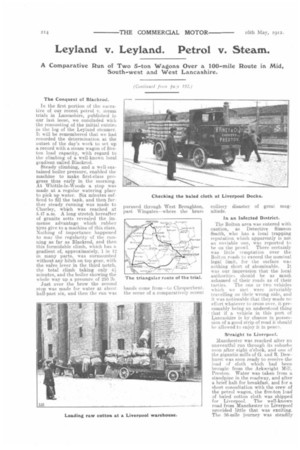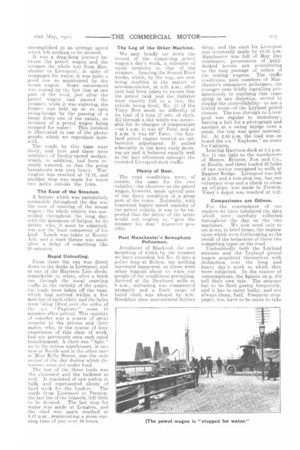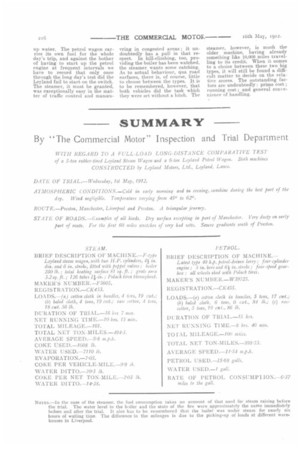Leyland v. Leyland. Petrol v. Steam.
Page 4

Page 5

Page 6

If you've noticed an error in this article please click here to report it so we can fix it.
A Comparative Run of Two 5-ton Wagons Over a 100-mile Route in Mid, South-west and West Lancashire.
(Continued front pa ,-e 192.) The Conquest oT Blackrod.
In the first portion of the narrative of our recent petrol v. steam trials in Lancashire, published it, our last issue, we concluded with the recounting of the initial entries in the log of the Leyland steamer. It will be remembered that we had recorded the determination at the outset of the day's work to set up a record with a steam wagon of fiveton load capacity, with regard to the climbing of a well-known local gradient called-Blackrod.
Steady climbing, and a well-sustained boiler pressure, enabled the machine to make first-class progress thus early in the morning. At Whittle-le-Woods a stop was made at a regular watering place to pick up water. Six minutes sufficed to fill the tank, and then further steady running was made to Chorley, which was reached at 5.47 a.m. A long stretch hereafter of granite setts revealed the immense advantage which rubber tires give to a machine of this class. Nothing of importance happened to mar the regularity of the running as far as Blackrod, and then this formidable climb, which has a gradient of, approximately, I in 12 in many parts, was surmounted without any hitch on top gear, with the valve lever in the third notch, the total climb taking only
minutes, and the boiler showing the whole way up a pressure of 250 lb.
Just over the brow the second stop was made for water at about. half-past six, and then the run was pursued through West Broughton, past Wingates—where the brass bands come from—to Chequerbent. the scene of a comparatively recent colliery disaster of great magnitude.
In an Infected District.
The Bolton area was entered with caution, as Detective Simeon Smith, who has a local trapping reputation which apparently is not. an, enviable one, was reported to be on the prowl. There certainly was little temptation over the Bolton roads to exceed the nominal legal limit., for the surface was nothing short of abominable. It was our impression that the local authorities should be as much ashamed of their roads as of their tactics. The one or two vehicles which we met were invariably travelling on their wrong side, and it was noticeable that they made no effort whatever to cross over, it presumably being an understood thing that if a vehicle in this part of Lancashire is by chance in possession of a good strip of road it should be allowed to enjoy it in peac:?, Straight to Livarpool.
Manchester was reached after an uneventful run through its suburbs soon after eight o'clock, and one of the gigantic mills of G. and R. Dewhurst was soon ready to receive the load of cloth which had been brought from the Arkwright Mill, Preston. Water was taken from a standpipe in the roadway, and after a brief halt for breakfast, and for a short consultation with the crew of the petrol wagon, the five-ton load of baled cotton cloth was shipped for Liverpool. The well-known road from Manchester to Liverpool nrovided little that was exciting. The 36-mile journey was steadily
accomplished at an average speed which left nothing to be desired.
It was a ding-dong journey between the petrol wagon and the steamer the whole way from Manchester to Liverpool; in spite of stoppages for water, it was quite a good one as maintained by the steam wagon. Some amusement was caused by the fact that at one part of the road, just after the petrol wagon had passed the steamer, while it was watering, the former was held up at an open swing-bridge by the passing of a barge down One of the canals, an instance of a petrol wagon being stopped for water ! This incident is illustrated in one of the photographs which we reproduce herewith.
The roads by this time were dusty. and here and there were stretches of freshly-tarred surface, which, in addition, had been recently watered, so that. the going hereabouts was very heavy. Warrington was reached at 12,12, and another stop was made for water two miles outside the town.
The Ease of the Steamer.
A feature which was particularly noticeable throughout the day was the ease of steering of the steam wagon ; Hie whole vehicle was controlled throughout the Icing day, with the minimum of fatigue, by its driver, who, it must be admitted, was not the least competent, of his kind. Lunch was taken at, Knotty Ash. and a start thence was made after a. delay of something like 20 minutes, Rapid Unloading.
From there the run was direct down to the docks in Liverpool, and at one of the Harrison Line sheds, remarkable La relate, after a brisk run through the usual crawling traffie in the vicinity of the quays, the loads were taken off the vans, which had arrived within a few mini.les of each other, and the hales were being lifted over the sides of the s.s. " Explorer " some To minutes after arrival. This rapidity or transfer was a source of great surprise to the drivers and their mates, who, in the course of long experience of this class of work, had not previously seen such rapid transhipment. A short run " light," up to the cotton warehouses, in one ease at Bootle and in the other ease at Miss Kelly Street, was the only period of the. day during which the wagons were not under load.
The last of the three loads was the clumsiest and the bulkiest as well. It consisted of raw cotton in bulk, and represented plenty of hard work for the loaders. The roads from Liverpool to Preston. the last leg of the triangle, left little
to he desired. The last stop for water was made at Lengths', and the shed was again reached at 8.47 p.m.. representing a gross running time of just over 16 hours. The Log of the Other Machine.
We may briefly set down the record of the competing petrol wagon's day's work, a schedule of equal intensity to that of the steamer. Leaving the Strand Road works, which, by the way, are now being doubled in the matter of accommodation, at 5.21 a.m., after care had been taken to ensure that the petrol tank and the radiator were exactly full to a line, the vehicle being level, No. 11 of the Viney fleet made no difficulty of its load of 5 tons 17 cwt, of cloth. All through a day which was noticeable for its changes of temperature —at "5 a.m. it was 45 Fain'. and at 2 p.m. it was 432° Fain'.the Leyland petrol engine wanted no carburetter adjustment. It pulled admirably in the keen. early morning air and it behaved equally well in the Into afternoon amongst, the crowded Liverpool dock traffic.
Plenty of Dust.
The road conditions were, of course, the same for the two vehicles ; the observer on the petrol wagon, however, made special note of the dusty condition of a great part of the route. Naturally, with somewhat higher speed capacity of the petrol vehicle, it was to be expected that the driver of the latter would not neglect to " give the steamer his dust " whenever possible.
Past Manchester 's Semaphore Policemen.
Avoidance of Blackrod, the surmounting of which by the steamer we have recorded, led No. 11 into a police trap at Bolton, butnothing untoward happened, as there were other wagons about to warn our people of the conditions prevailing. Arrived at the Dewleirst mills at 8 am., unloading was commenced promptly and a fresh cargo of baled cloth was aboard by 9.30. Breakfastthen necessitated further delay, and the start for Liverpool was eventually made by 10.35 a.m. Manchester was full of May Day celebrants, processions of gailydecked horses not contributing to the easy passage of either of the testing wagons. The traffic conditions, past numbers of Manchester's semaphore policemen, the younger ones wildly signalling womiscuously to anything that came along in any direction, served to display the controllability—to use a horrid word—of the Leyland petrol chassis. The run through to Liverpool was regular to monotony ; barring a halt. for a. photograph and another at. a swing bridge over a canal, the trip was quite uneventful. At 2.55 p.m. the load was on board the s.s. "Explorer, en route for Calcutta..
Leaving Harrison dock at3.5 p.m. No. 11 ran light to the warehouses of Messrs. Briscoe, Fox and Co., at Bootie, and there loaded 25 bales of raw cotton consigned to mills at Bamber Bridge. Liverpool was left. at 5.32, and a non-stop run, bar one voluntary stop and a check to clean an oil-pipe, was made to Preston. Vmey's depot was reached at 8.21.
Comparisons are Odious.
For the convenience of our readers we have tabulated the datawhich were carefully collected throughoutthe day on the two machines. We now need only to set down, in brief terms, the impressions which were forthcoming as the result of the behaviour of these two competing types on the road.
Undoubtedly both the Leyland steamer and the Leyland petrol wagon acquitted themselves with distinction over the long and heavy day's work to which they were subjected. In the matter of consumptions, the figures on p. 210 tell their own tale. The steamer has to be fired pretty frequently, and it has to carry bulky, and not always clean, fuel. Frequent stoppages, too, have to be made to take
up water. The petrol wagon carries its own fuel for the whole day's trip, and against the bother of having to start up the petrol engine at frequent intervals we have to record that only once through the long day's test did the Leyland fail to start on the switch. The steamer, it must be granted, was exceptionally easy in the matter of traffic control and manceu vring in congested areas ; it undoubtedly has a pull in that respect. In hill-climbing, too, providing the boiler has been watched, the steamer wants some catching. As to actual behaviour, qua road surfaces, there is, of course, little to choose between the types. It is to be remembered, however, that both vehicles did the task which they were set without a hitch. The steamer, however, is much the older machine, having already something like 10,000 miles travelling to its credit. When it comes to a choice between these two big types, it will still be found a difficult matter to decide on the relative scores. The outstanding factors are undoubtedly: prime cost ; running cost; and general convenience of handling.




















